Badge/Motto
Just when you thought that no school badge had survived, good ol' David Waugh came up with this piece of history. Actually, we've since acquired another one from Brian Harrison-see Homepage
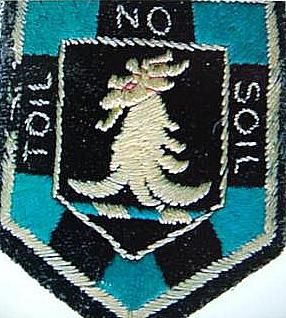
New NEWS
This badge ..(was unique badge photo as the only photo we had of a maroon version) was on ebay and went for 99p. Hopefully it was bought by a GGSer who will donate it to our physical collection of school mags etc which will, at some time in the near future.. before all of us Old Goats die... be donated to Gateshead Local Studies
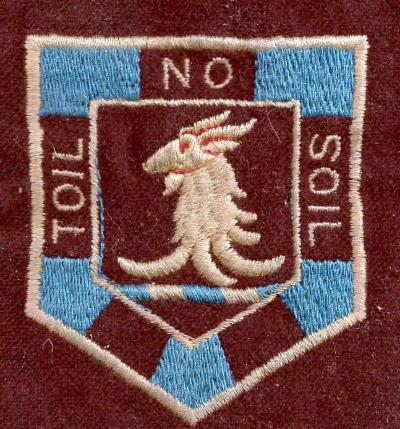
Jon Bratton writes
"I don't recall ever being told definitively what the motto meant but, from the badge, I deduced that the No must relate to both words to read NO TOIL, NO SOIL meaning No Effort, No Reward.I was wrong.. That was just me as an 11 year old trying to make sense of it
Reading it clockwise as TOIL NO SOIL always appeared to make no sense (other than suggesting that farming was not a recommended career) ...yet it is shown as reading Toil No Soil, for example as the logo on the long photo of 1961,

and see the War Memorial photo below
Others, including Malcolm Sunter, have said they understood it to mean 'work, (or hard work) is no disgrace' but that's not what it appears to say
Let's be honest, as a motto it's a bit obscure. It's not Latin..it appears to be in modern parlance and yet none of us well educated Grammar lads can make any sense of it. I have never come across an ex Gateshead Grammar person who could explain it
Our 1947 correspondent was unaware of it so it wasn't used as a part of the uniform then but... the motto has been around since at least 1921 when the 1914-18 War Memorial was erected. It is said elsewhere that Toil No Soil was the motto of the original private school of 1883 and was continued when the school passed into public ownership.
Listen up
Here is the definitive explanation...or is it?
Recently, I came across a clue in this book

Lewis, Cherry (2000) The Dating Game: One Man's Search for the Age of the Earth, Cambridge University Press, ISBN 0-521-89312-7
It's about Arthur Holmes, Our most famous Old Boy academic
"Walking to school every day with his nose in a book he must have exemplified the school motto taken from an ancient Greek poem 'Toil is no disgrace but idleness is a thing of reproach' which was neatly, but perhaps unfortunately rendered down to 'Toil no soil' "
So I googled
The quote that comes up most often is from Hesiod "Work is no disgrace: it is idleness which is a disgrace"
Google it and you'll find many references.
The early Greek philosophers spoke of just the opposite. Toil was anything but noble. Hesiod was was no aristocrat; he was a farmer poet, a hard-working Boeotian peasant. (Boeotia..ancient and modern district of central Greece, of which Thebes was and remains the chief city) and that line is his expression of the work ethic, contained in his poem Works and Days
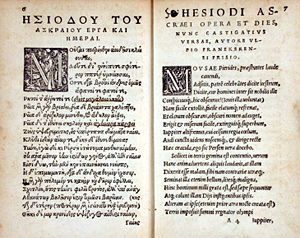
Many old boys have told me that they were told it means 'work is no disgrace' which matches exactly with the first part of Hesiod's quote.
I am satisfied that the motto is a reflection of Hesiod's work ethic and that there is, in effect, a comma after toil meaning 'toil is no soil' meaning 'toil is no disgrace'
Disgrace is certainly a synonym of soil as a verb but here it is used as a noun
Is that clumsy ..contrived? Cherry Lewis the Author quoted above must think so.
'Soil' as a noun means 'earth' and 'excrement' (as in 'soil stack' or 'night soil'.)
So, is the motto 'Toil No Soil' a load of soil or is it acceptable, in formulating a short punchy rhyming motto, to use a verb's meaning as a noun?
This motto wasn't dreamt up by the office junior in the education offices. The writer would have been a wordsmith....of the like of Shakespeare, who certainly played fast and loose with word meanings or, more correctly we should say, took artistic licence which allows poets...motto/slogan writers to ignore the conventions of grammar or language
From Troilus and Cressida, there are these lines
But I would have the soil of her fair rape
Wiped off in honourable keeping her.
Could that be the stain of her fair rape or the disgrace...who knows...you decide
TC.II.2.148-9.
I'm not sure if I've soiled the riddle
That's not a typo, by the way. Shakespeare also used 'soil' thus in Sonnet 69
The soil is this, that thou dost common grow.
deriving from the verb assoil, to solve
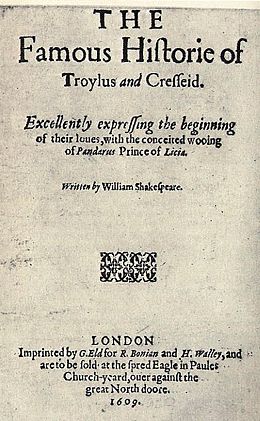
Is the motto a clever "riddle, wrapped in a mystery, inside an enigma"? Its certainly had countless schoolchildren (and a few masters no doubt) debating it since the 1890's.
Or is it just naff?
Discuss.
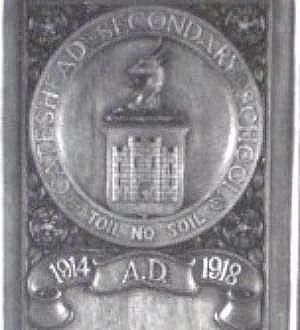
Close up of the War Memorial
Around the top it says Gateshead Secondary School and at the bottom Toil No Soil
Any other views, comments? please email
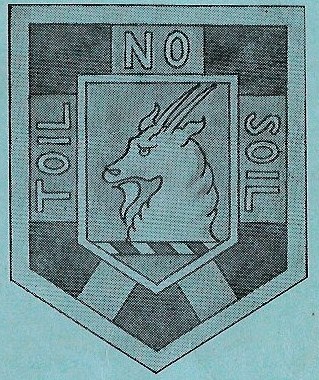
From the cover of The Caprian Dec 1964, thanks to Dave Waugh
Jon Bratton further writes
"A Latin motto is almost a sine qua non (an essential requirement) for Schools
I think the fact that the motto was in English adds weight to my belief that it was not the original private school that devised it ...for they would likely choose a motto in Latin (or French or Greek).. but the new ground breaking Higher Grade School which offered higher education but not following the traditional grammar school's emphasis on Latin grammar
A school motto in English is not unique but it is rare."
Here's a link for those wishing to read more on school mottos
Well, I got that wrong for I now know that it was the Headmaster of the original school who devised the motto and he did not use Latin because the quote was from Greek....bleedingly obvious now. The new information came from school magazine The Apple Cart of April 1946
I added 'Toil No Soil' to the Wikipedia page on Mottos Trawl down to G in the Schools section to see it... and, while at it, I created a Wikipedia Gateshead Grammar School page which has been edited a few times by others, particularly those who have chosen to add their own names to the Notable Alumni list. I'm tempted to add my own name for creating this huge tome.
No need for me to do it. One of you guys will on the basis that this website is a larger piece of academic work than would be required for me to earn a PhD